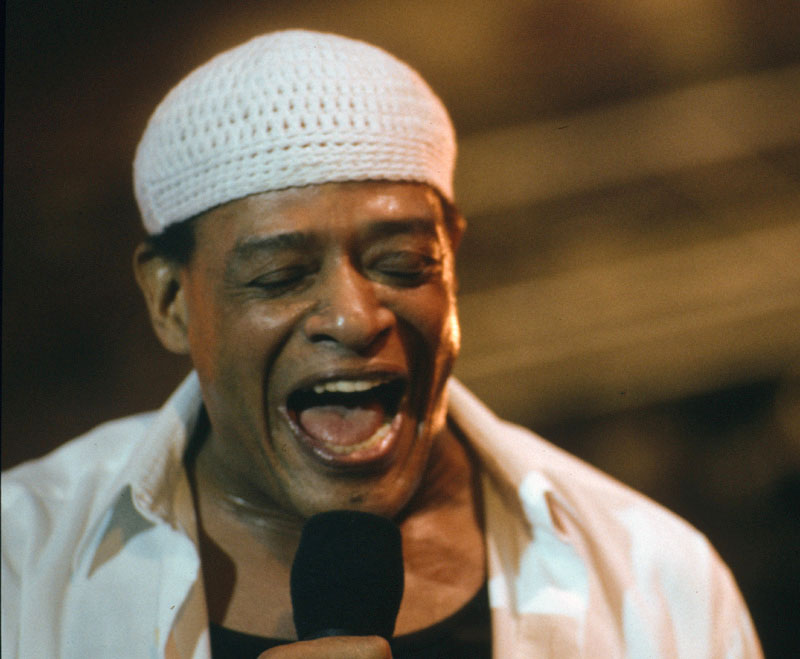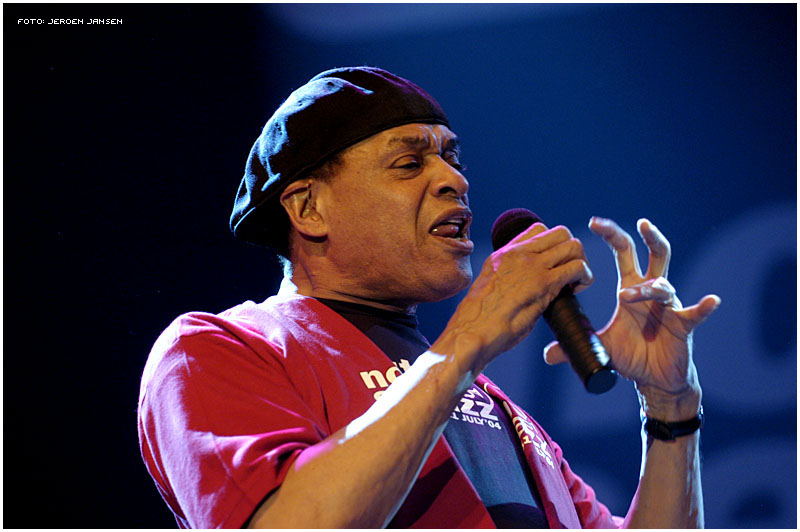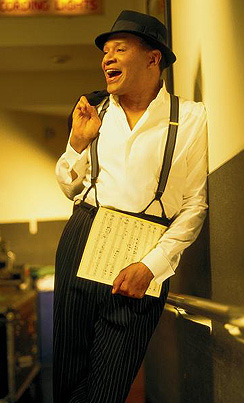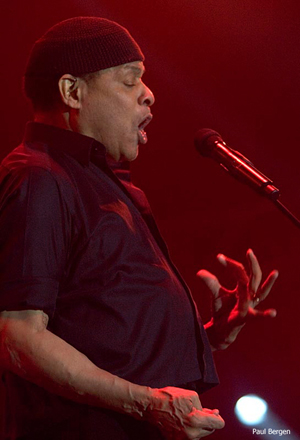AL JARREAU / “We Got By”
Within the context of jazz vocal recordings, Al Jarreau’s Look To The Rainbow is certainly in the top ten and arguably among the top five of all time. The man is a legendary one-man band, able to mimic and match the sound of each band instrument, including percussion.

I remember the first time I saw him live. Al was opening for Herbie Hancock. I don’t think I stayed for all of Herbie’s set. I know I didn’t miss a note of Al’s performance. Here was the heir apparent to a long line of jazz vocalists out of the bebop and scatting mode, beginning with Louis Armstrong, but including a wide range of hipsters from Cab “Mr. Minnie the Moocher” Calloway, to the fountainhead of hipology Babs Gonzalez, to the twin gods of vocalese (fitting lyrics to famous jazz instrumental solos) King Pleasure and Eddie Jefferson, and down to people like Jon Hendricks and Oscar Brown, Jr. As far as making a major recording, Al Jarreau is the one. Look To The Rainbow is unmatched for a recording of scat.
What Jarreau has going for him is more than scat, he is also a brilliant interpreter of ballads and he has one of the finest philosophical minds in music. He’s not the only one, but what distinguishes him from the pack is that he produced a great recording of vocal jazz that stands as both a summation of one person’s talents and contributions, and also stands as a standard of its genre.
Given the realities of the music business, I knew beforehand that this early album was going to be one of Jarreau’s high points, if not “the” highpoint of his recording career. In order to survive on a major label, a recording artist has to sell. In order to sell, your records have to be popular, have to get radio play…. Y’all see where this is going, I don’t have to spell it out. Today, there’s not much jazz on the radio and nearly no hardcore jazz on (smooth) jazz radio stations.

I gave thanks for the gift of Rainbow and reserved a warm spot in my heart for Mr. Jarreau’s singular accomplishment. Then, seventeen years later (that’s at least four generations in pop music), Al Jarreau assembles a hip band, invites friends into the studio to be a live audience, and records Tenderness. Lightening strikes twice. I don’t really know which recording I prefer (usually the one I’m listening to at the time). If pushed to do so, I would give a vocal performance edge to Rainbow, but a material content and band performance edge to Tenderness.
Rainbow was a well-known album in its time, but I’m willing to bet a majority of music lovers have never heard it. When Tenderness came out in 1994, it barely made an impact on the general public. That’s a shame. As the six cuts in jukebox make clear, both albums are winners.
What is truly remarkable is that after nearly twenty years of singing, Al Jarreau’s voice remains a beautiful instrument. He has lost none of his flexibility or luster. And though many of the recordings in between these two were lightweight in comparison, the truth is Al can still sing with all the fire and hunger and energy of a challenger to the throne. This is one king who is not resting on his laurels. If you love jazz vocals, here are two albums every collection should include.
—Kalamu ya Salaam
Take Five, worrying the melody and cash registers
I have some kind of scattered reactions to these songs. One is, I had no idea “Take Five” had lyrics. (I’m sure they were added later, but I’d only ever heard the classic Dave Brubeck version.) I like Al’s version a lot.
Two is, I sometimes wonder what would happen if Al knocked it off with all the “worrying the melody” and just sang a song as written. You’d probably get something pretty close to “We Got By,” I guess, which wouldn’t be bad at all. That’s another good one. I’m not saying Al’s trademark style isn’t impressive. It is. Very much so. But sometimes, it’s more impressive to marvel at than actually enjoyable to listen to.
Three, I was still working for Warner Bros. when Tenderness came out. That record was a very conscious attempt on Al’s part to recapture his old fans and, more importantly, sell some records. Before Tenderness dropped, we were told over and over that it was going to be Al Jarreau’s big comeback album. (Around that time, Natalie Cole and a couple of other people were having success with a kind of throwback style, so I guess the big brass at W.B. were thinking, “Why not Al?”) On his promotional tour, Al came through New Orleans and during his post-performance working-the-room thing, he stopped by the table I was sitting at. I told him that I was glad he was going back to a more organic sound and I mentioned that I’d grown up hearing his records because my Dad was a big fan. “It’s good to hear you stretching out again,” I told him. He flashed that wide smile of his and said, “Whatever gets those cash registers ringing.” I’m not saying that comment was the moment I decided to quit being a sales rep., but it sure as hell didn’t encourage me to stay. It occurs to me now though that Al was aware he was talking to an industry type. (It was a private party.) That might have been a calculated statement aimed at letting the promotional and sales force know that he wanted us to push his record. Or he might’ve meant it just like it ended up sounding. I really can’t say. I just know that—as Kalamu alluded to—the music business is some ugly shit. People complain all the time about how little good music comes out on the major labels each year. What surprises me isn’t how little good music comes out, it’s how much. Even for a consumate musician like Al Jarreau, one who you might think is far-removed from the crass commercialism of pop music, sometimes it really is all about the money.
—Mtume ya Salaam
This entry was posted on Sunday, November 19th, 2006 at 1:36 am and is filed under Classic. You can follow any responses to this entry through the RSS 2.0 feed. You can leave a response, or trackback from your own site.
Leave a Reply
| top |